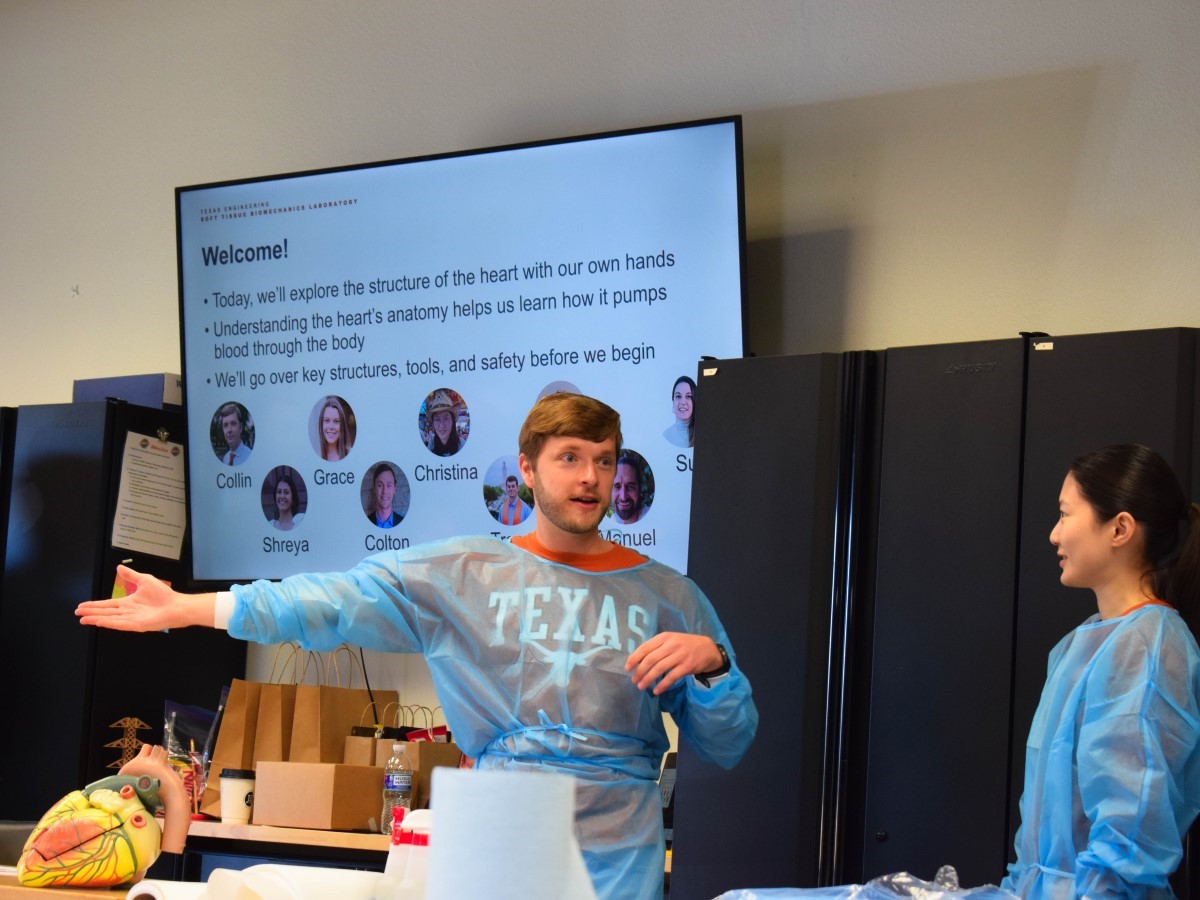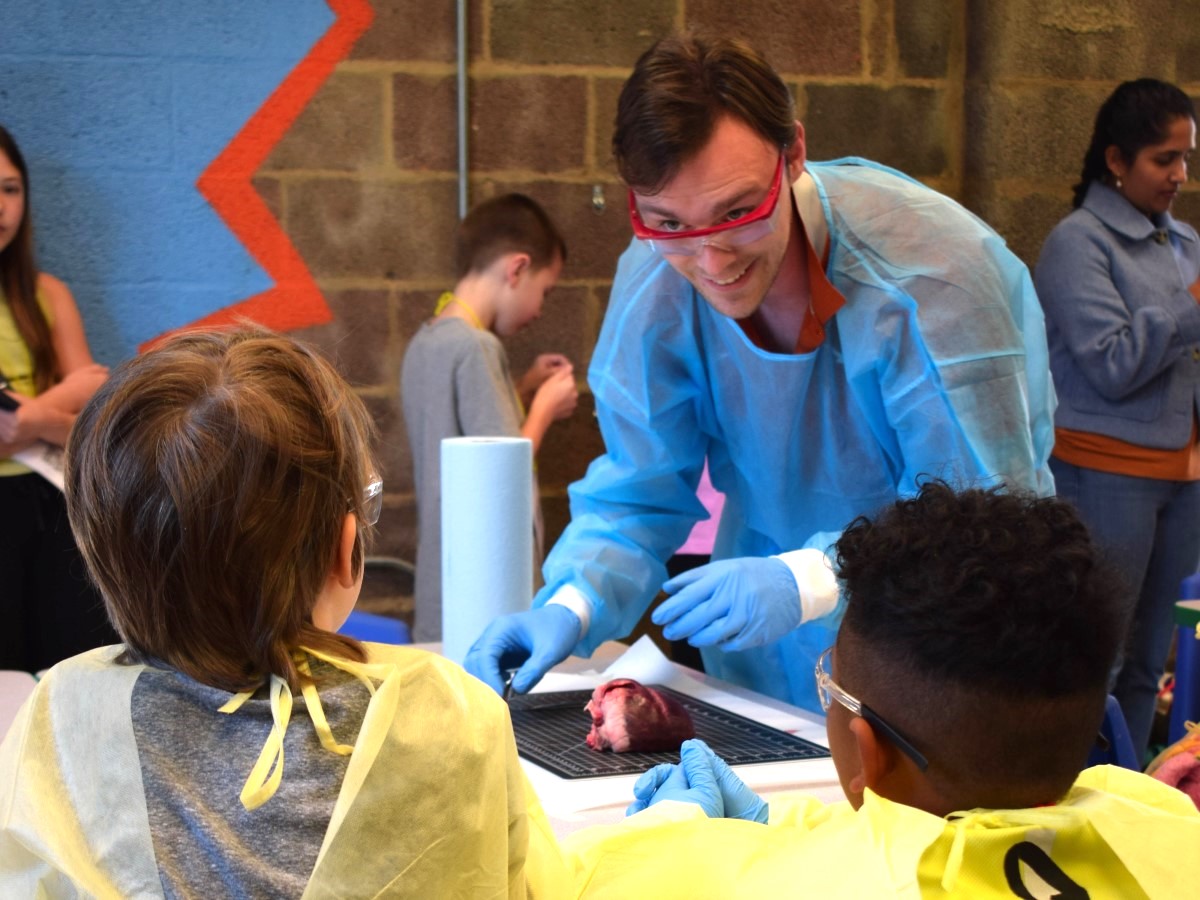
In the hustle and bustle of daily life at the Cockrell School of Engineering, it can be easy to lose sight of how exciting the field can be. For Manuel Rausch and his students, an annual trip to the Science Mill in Johnson City serves as a great reminder.
Rausch and his students have partnered with the Science Mill for the past three years to provide workshops for kids in the Hill Country. This year’s workshop earlier this month focused on the most vital and complex organ: the heart.
“One, for the kids, it’s a pretty cool opportunity to get their hands on a real organ. The second reason is that my research focuses primarily on heart valve disease, so I work with hearts every day,” said Collin Haese, a mechanical engineering Ph.D. student in Rausch’s lab who led this year’s workshop.

Manuel Rausch, assistant professor in the Cockrell School of Engineering’s departments of Biomedical Engineering and Aerospace Engineering and Engineering Mechanics
Haese’s work focuses on the tricuspid valve—one of the heart’s four valves that ensures one-way blood flow. His research combines laboratory experiments and computational tools to study the valve in both healthy and diseased states to improve repair techniques. Recently, he has been working on refining transcatheter edge-to-edge repair, a minimally invasive procedure that offers significant advantages over traditional open-heart surgery.
These workshops, available to kids aged 5 to 17, aim to spark curiosity and interest in engineering. Another version of Haese could easily be in one of these workshops.
Haese didn’t get involved in engineering until his senior year of high school. He got his undergraduate degree in aerospace engineering from the University of Wisconsin-Madison. He was interested in going into structural engineering before he happened to take a class from Rausch on soft tissue engineering that shifted his whole plan.
“At the end of the day, there is so much fundamental knowledge that goes into engineering that is translatable across disciplines,” said Rausch, a professor in the Cockrell School’s Department of Aerospace Engineering and Engineering Mechanics who also has an appointment in the Department of Biomedical Engineering and the Walker Department of Mechanical Engineering. “The heart is a pump, just like any pump in an engineering system, with valves, pressures and flows. The underlying physics that govern these things—a heart, a rocket engine, a building pipe—are all fundamentally the same.”
Rausch is a perfect example of the overlapping nature of engineering. He first got into engineering as a teenaged gearhead who wanted to better understand cars to build them. But he eventually branched off into mechanical and later medical applications of the discipline.
Beyond the broad applicability of engineering fundamentals, Haese and Rausch offered a few takeaways from the experience for aspiring engineers and their families:
- STEM is for everyone. Whether your child is interested in health, space, computers, or something else entirely, there’s a place for them in STEM.
- Curiosity is key. Encourage your kids to ask questions, explore their interests, and stay open to new possibilities.
- Mentors matter. Seek out opportunities for your children to connect with teachers, scientists, and engineers who can inspire and guide them.
- Hands-on learning is powerful. Experiences like dissections and workshops at places like the Science Mill that can spark a lifelong passion for science and engineering.

The Science Mill and Rausch’s lab are both committed to continuing the partnership. The relationship dates back before the COVID-19 pandemic when Rausch first met with Bob Elde, co-founder of the Science Mill and former dean of the University of Minnesota’s College of Biological Sciences.
“We know that the pipeline to STEM careers is very leaky. A big part of fixing that is enabling kids to imagine themselves in STEM careers, and their ability to imagine themselves in these careers is greatly influenced by seeing these young role models they can look up to,” said Elde. “It becomes easier for the students to imagine themselves following the same STEM pathways. They can see it’s possible for them, too. These UT graduate students are the ultimate peer mentors.”
It took a couple years to find the right scope for the relationship. The first workshop, in 2023, was led by Gabriella Sugarman, a member of Rausch’s lab at the time, who is now an assistant professor of biomedical engineering at San Jose State University. Each year, a different student plans and leads the workshop.
After attending last year’s event—led by biomedical engineering Ph.D. student Grace Bechtel—Haese was determined to take the reins this year.
“Working with the children re-grounds me; it is a great reminder that science is fun. Sometimes, we take for granted all the cool things we get to do here, but seeing how excited these kids get and how fascinated they are to see these things we get to work with every day is a lot of fun.”
Collin HaeseCockrell School of Engineering
